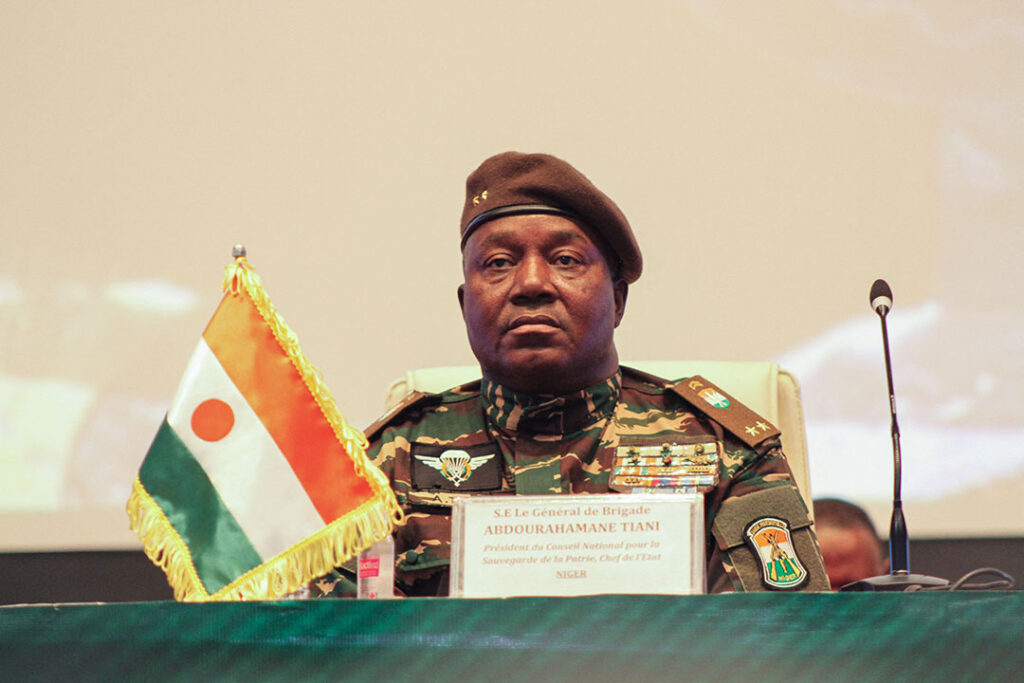It has been two years since Gen. Abdourahamane Tiani overthrew Niger’s democratically elected president and pledged to restore security to the country. However, the latest data shows Tiani has made little progress against a rising tide of terrorist violence.
“Until the fall of 2023, the insurgencies in Niger were at a relatively steady state,” analyst Michael DeAngelo wrote recently for the Foreign Policy Research Institute. “Niger’s pre-coup approach was a limited success, while its post-coup approach is a failure.”
Before the 2023 coup, then-President Mohamed Bazoum pursued a policy of increased security within insurgent areas paired with talks to determine their demands. Tiani has focused on securing the capital of Niamey, leaving large parts of the country with little protection from terrorists, according to DeAngelo.
Jama’at Nusrat al-Islam wal-Muslimin (JNIM) and the Islamic State Sahel Province (ISSP) operate openly in western Niger along the border with Burkina Faso and Mali and in the Dosso region, which borders Benin and Nigeria. In eastern Niger, Jama’atu Ahlis-Sunna Lidda’Awati Wal-Jihad (JAS) and the Islamic State West Africa Province (ISWAP) continue to operate in Diffa near Lake Chad.
Niger’s inability to stifle terrorist groups poses a growing threat to its coastal neighbors to the south. In the past year, Benin and Nigeria have fended off incursions into their territories from terrorists based in Niger.
In June, 200 ISSP terrorists on motorcycles stormed a Nigerien Army base near the border with Mali and killed 34 soldiers. A few days later, ISSP terrorists killed 17 civilians at prayer in Dosso near Benin and Nigeria. The attacks helped make June the deadliest month for terrorist attacks in Niger since April 2021.
The June attack was the latest in a string of terrorist attacks across western Niger that left dozens of soldiers and civilians dead. In March, about the time Tiani was sworn in as president, terrorists killed 44 civilians in Niger’s part of the Liptako-Gourma region.
In late May, 100 ISSP fighters stormed the Eknewan camp in Tahoua province and killed nearly 60 soldiers. A few days earlier, fighters aligned with al-Qaida killed 40 soldiers in Falmey, near the borders with Benin and Burkina Faso.
“ISSP’s campaign in June marked a clear return to committing mass atrocities in rural areas by targeting prayer gatherings, markets, and entire communities, leading to mass displacement,” analysts with the Armed Conflict Location & Event Data (ACLED) project wrote about Niger.
Tiani has blamed the increasing violence on local politicians and foreign militaries that he claims prevented Niger from fighting terrorists adequately. Nigerien soldiers have told their superiors that they lack the resources to fight the terrorists, according to The Africa Report.
The situation has become so bad that one junior officer recently confronted Gen. Moussa Salaou Barmou, a junta member whom Tiani recently promoted. Barmou later approached junta member Salifou Mody, Niger’s minister of defense, about the officer’s claims and threatened to resign in protest, according to media reports.
Observers say that Tiani is increasingly isolated with a small circle of advisors in the presidential compound in Niamey, where Bazoum remains a prisoner. They add that Tiani largely rules Niger alone.
An unnamed West Africa diplomat told The Africa Report that Niger’s alliance with the juntas ruling Burkina Faso and Mali helps keep Tiani in power. The three nations left the Economic Community of West African States (ECOWAS) in January, founding their own regional bloc called the Alliance of Sahel States (AES). That effort also appears to be struggling due to increased tensions with the bloc’s southern neighbors.
“The junta is economically suffocating — borders closed with Benin, worsening ties with China. You can’t ask people to suffer forever,” the West African diplomat said. “It’s been two years since they took power. For what?”

